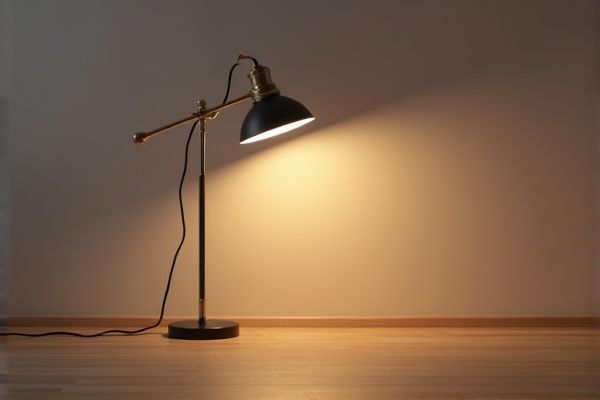
Clamp lamps offer versatile, space-saving lighting solutions by attaching directly to surfaces, ideal for focused tasks or small areas, while standing lamps provide stable, freestanding illumination that enhances overall room ambiance. Discover which lighting option best fits your needs and complements your space by reading the rest of the article.
Table of Comparison
| Feature | Clamp Lamp | Standing Lamp |
|---|---|---|
| Design | Compact, clips onto surfaces | Free-standing, floor-based structure |
| Space-saving | High, ideal for small areas | Moderate, requires floor space |
| Portability | Easy to move and reposition | Less portable, heavier |
| Lighting Coverage | Focused, adjustable direction | Ambient or task lighting with wider coverage |
| Installation | No tools, clamps on edge | Simple assembly, no mounting needed |
| Use Cases | Desk work, reading, crafts | Living rooms, bedrooms, general lighting |
| Adjustability | Highly adjustable arms and heads | Limited adjustability, fixed height |
| Price Range | Generally lower cost | Varies, often higher price |
Introduction: Clamp Lamp vs Standing Lamp
Clamp lamps offer flexible positioning and space-saving benefits by attaching directly to surfaces, making them ideal for small or cluttered areas. Standing lamps provide stable, freestanding illumination with wide light dispersion, suitable for general room lighting and aesthetic enhancement. Choosing between clamp lamps and standing lamps depends on space availability, lighting needs, and design preferences.
Design and Structure Comparison
Clamp lamps feature a compact, adjustable design with a sturdy clamp base, allowing them to be securely attached to desks, shelves, or other surfaces, maximizing space efficiency. Standing lamps have a taller, freestanding structure with a fixed base, often designed to illuminate larger areas and serve as decorative elements in a room. The structural differences impact flexibility and placement options, with clamp lamps offering targeted lighting in confined spaces, while standing lamps provide ambient light and versatility in room layout.
Space-Saving Benefits
Clamp lamps offer significant space-saving benefits by attaching directly to surfaces like desks or shelves, freeing up valuable floor space in your room. Standing lamps require a dedicated spot on the floor, which can limit arrangement options in smaller areas. Choosing a clamp lamp can optimize your workspace or living area by providing flexible lighting without sacrificing room.
Light Direction and Adjustability
Clamp lamps offer precise light direction and high adjustability, allowing you to position the light exactly where needed by attaching it to surfaces or edges. Standing lamps provide broader illumination with adjustable necks or heads, but lack the flexibility of clamping to various spots. Your choice depends on whether you need targeted task lighting or general ambient light in your space.
Installation and Setup Process
Clamp lamps offer a quick and tool-free installation by simply attaching to the edge of a desk or shelf, making them ideal for adaptable lighting positions. Standing lamps often require assembly of multiple parts and placement in a fixed spot, which can take more time and effort. Your choice depends on whether you prioritize easy setup or a stable, permanent lighting solution.
Versatility in Use Cases
Clamp lamps offer superior versatility, allowing you to attach them to desks, shelves, or headboards, making them ideal for focused lighting in small or flexible spaces. Standing lamps provide stable, broad illumination suited for living rooms or reading corners, enhancing ambient light without taking up desk space. Your choice depends on whether you need adjustable task lighting with space-saving benefits or steady ambient light for larger areas.
Energy Efficiency and Bulb Options
Clamp lamps offer superior energy efficiency by allowing targeted lighting, which reduces wasteful illumination compared to standing lamps that diffuse light over larger areas. Both clamp and standing lamps accommodate a range of bulb options, including LED, CFL, and incandescent, but clamp lamps' flexibility makes them ideal for adjustable, task-specific lighting with energy-saving LED bulbs. Choosing LED bulbs enhances energy efficiency significantly in either lamp type, providing long-lasting performance and lower electricity consumption.
Durability and Maintenance
Clamp lamps offer durable construction with fewer moving parts, reducing maintenance needs and extending their lifespan in compact spaces. Standing lamps often have more intricate designs and joints that may require periodic tightening or replacement, increasing upkeep over time. Choosing between them depends on your preference for low-maintenance lighting solutions versus aesthetic versatility.
Cost Analysis and Value
Clamp lamps generally offer a lower upfront cost compared to standing lamps, making them a budget-friendly option for targeted lighting needs. Standing lamps tend to provide greater value over time due to their durability, larger light coverage, and multifunctional designs, which can enhance your room's ambiance and utility. When weighing cost analysis and value, consider how the initial price aligns with your long-term lighting requirements and space efficiency.
Choosing the Right Lamp for Your Needs
Clamp lamps offer space-saving versatility by attaching securely to desks or shelves, providing targeted lighting ideal for tasks requiring focused illumination. Standing lamps deliver broader ambient light and can enhance room aesthetics while offering adjustable height and brightness options to suit various living spaces. Selecting between clamp and standing lamps depends on available space, lighting purpose, and desired flexibility in placement.
 homyna.com
homyna.com